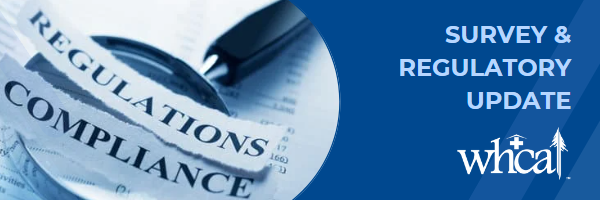Jan 26 2024 | OIG Report – Washington State Failed to Ensure that Nursing Homes Complied with Federal Requirements for Life Safety, Emergency Preparedness, and Infection Control
In the fall of 2022, twenty Washington skilled nursing facilities had unexpected visits from auditors representing the Office of Inspector General (OIG). These surprise visits to ten percent of Washington facilities were a result of the OIG’s oversight activities to ensure that our state survey agency (SA), Residential Care Services (RCS) and State Fire Marshals were ensuring facility compliance with the federal life safety code, emergency preparedness, and infection control standards/requirements.
In doing so, the OIG auditors sampled facilities based on “risk factors” determined through deficiencies reported in the federal database from January 2020 through the first week of July 2022. During these on-site visits, the auditors evaluated the facility for life safety violations, reviewed the facilities emergency preparedness and communications plans, and reviewed the policies, procedures, and documentation related to infection control. They did this review in comparison with the Federal requirements for nursing homes and determined non-compliance to be a violation or deficiency.
According to the recently released OIG report, Washington State did NOT ensure that nursing homes complied with the Federal requirements. The auditors state they identified deficiencies in all twenty facilities, totaling a whopping 525 violations. The report goes into greater detail regarding the authority, audit process, and violations, however the outcome of deficiency determinations is listed below:
- 91 deficiencies related to noncompliance with life safety requirements were found. These deficiencies were related to building exits, smoke barriers, and smoke partitions (15); fire detection and suppression systems (27); carbon monoxide detectors (2); hazardous storage areas (3); smoking policies and fire drills (10); and elevator and electrical equipment testing and maintenance (34).
- 155 deficiencies of the deficiencies were related to noncompliance with emergency preparedness requirements. These deficiencies were specifically regarding emergency preparedness plans (22); emergency power (6); plans for evacuations, sheltering in place, and tracking residents and staff during and after an emergency (18); emergency communications plans (62); and emergency preparedness plan training and testing (47).
- 279 deficiencies were related to noncompliance with infection control requirements. These deficiencies were related to Infection Prevention and Control Plans (IPCP) and antibiotic stewardship programs (25), infection preventionists (2), influenza and pneumococcal immunizations (16), COVID-19 immunizations (31), COVID-19 reporting (11), COVID-19 case notifications (1), COVID-19 testing (37), and staff COVID-19 vaccination requirements (156).
The report determined that as a result of the state agency not holding facilities accountable, residents, staff, and visitors of the twenty nursing homes sampled are at an increased risk of injury, significant illness, or death during a fire or other emergency, or in the event of an infectious disease outbreak. Further determinations from the OIG revealed that Washington State did not ensure that nursing facility management was educated about life safety and emergency preparedness training resources and that the frequent turnover of facility management and staff were factors in them not being aware of the Federal requirements.
The OIG has recommended that DSHS, specifically RCS complete the following as a result:
- Follow up with the twenty nursing homes reviewed in the audit to ensure that these nursing homes have taken corrective actions to address the life safety, emergency preparedness, and infection control deficiencies identified.
- Provide training to State surveyors to ensure that deficiencies related to life safety, emergency preparedness, and infection control are consistently identified.
- Educate nursing home management that life safety and emergency preparedness training resources are available to nursing home staff.
RCS’s response and plan submitted to the OIG is included in the report. As a result of this report, the SNFs in Washington should expect an increased focus from surveyors, complaint investigators, and the State Fire Marshal regarding life safety code, emergency preparedness, and infection prevention and control. It is vitally important that facility leadership takes an active role to ensure education, training, and resources are provided to facility staff in these areas.
WHCA is also working to develop educational offerings in 2024 to help facilities meet this need. The Washington State Fire Marshal’s office will be offering an educational session during our upcoming Virtual Winter Conference on January 30, as well as multiple sessions regarding infection prevention and control on the following dates, January 31, and February 1.
The OIG Report, released on December 8, 2023, is publicly available and can be found on the OIG website: Washington State Did Not Ensure That Selected Nursing Homes Complied With Federal Requirements for Life Safety, Emergency Preparedness, and Infection Control (hhs.gov)
If you have questions regarding the SNF requirements, please contact Elena Madrid or call at (360) 352-3304, extension 105.
Posted in Skilled Nursing Facilities, Survey & Regulatory

